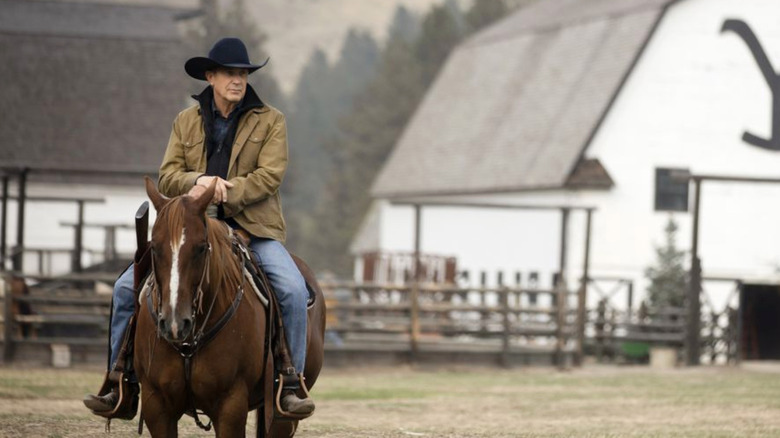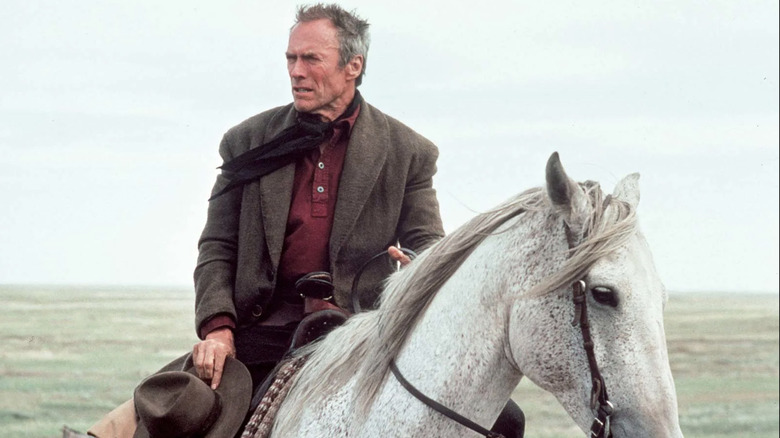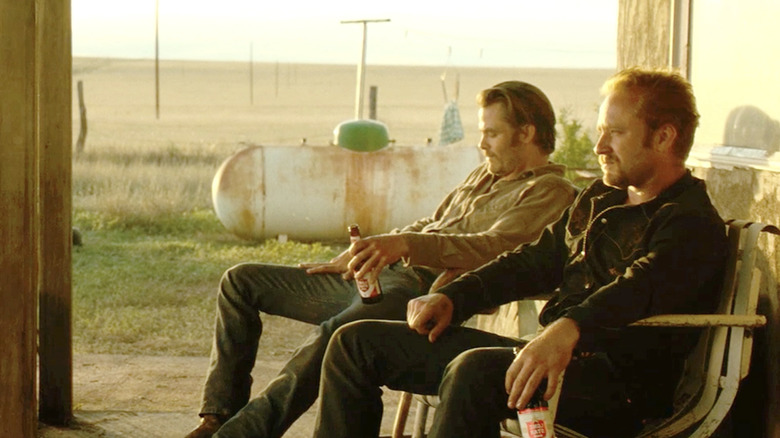A Clint Eastwood Classic Put Taylor Sheridan On The Path To Yellowstone
Taylor Sheridan is a filmmaker and writer who has put the American frontier at the center of nearly all his stories. One of the most prominent examples is "Yellowstone," a neo-western TV series that centers on the inter-personal relationships of ranchers and those surrounding the borders of their land. The show's first season received a mixed reception, with subsequent seasons receiving a much more positive reception.
The majority of "Yellowstone" was written by Sheridan, with the filmmaker occasionally directing an episode or two throughout the show's five-season run. However, Taylor Sheridan's love for the Western didn't start with "Yellowstone." He's dabbled in the genre with films like "Hell or High Water" telling stories of modern-day outlaws. Sheridan's passion for giving the Western genre a modernized spin wasn't from out of nowhere. Instead, Sheridan's movie and television work stemmed from the films and literature that influenced him in his early adulthood. Morally ambiguous and violent stories would inspire Sheridan to create some of his own, most prominently "Yellowstone." And there was one specific Clint Eastwood Western that inspired it all.
The influence of Unforgiven
In an interview with Variety, Sheridan talked about "Yellowstone" and his inspirations, mentioning several prominent authors and directors. All of Sheridan's influences had one thing in common, that being they all left their distinct mark on the Western genre:
"I was very influenced by writers like Cormac McCarthy, Larry McMurtry, Toni Morrison, who wrote about the time around the Civil War, which is obviously very similar themes. There's a lot of Westerns about it. And in terms of the movies that influenced me, it was watching 'Unforgiven' when I was in my late teens or very early 20s. The same with 'Dances With Wolves,' where you're looking at the Western genre through a whole new lens that had never been explored before."
"Unforgiven" remains one of Clint Eastwood's best works as an actor and a director. The themes and aesthetic of "Unforgiven" can be seen not just in "Yellowstone," but in Sheridan's other works. The same can be said for the works of Cormac McCarthy, whose novels "Blood Meridian" and "The Crossing" have the same dreary and subtle storytelling techniques seen in another piece of Sheridan's, "Wind River."
Sheridan's bodies of work are wholly original, but McCarthy and Eastwood can clearly be seen as the blueprints for many of his scripts.
Keeping the western alive
The existential westerns of Cormac McCarthy permeate through much of Sheridan's work, with books like McCarthy's "Border Trilogy" serving as a thematic equal to Eastwood's film "Unforgiven." These somber westerns are grounded in reality, devoid of the mysticism usually expected with the western genre. Whereas the violence and action in films like "Magnificent Seven" are glorified, McCarthy's and Eastwood's bodies of work give a sobering reflection on the very same thing other westerns glorify.
McCarthy's Border trilogy examines the lasting consequences of a life of violence and the extinction of the cowboy or outlaw, like "Unforgiven." Taylor Sheridan looks to replicate that realism, and while there is plenty of action in "Yellowstone," "Sicario," and "Hell or High Water," it's violence that feels real and has consequences to it.
Sheridan's examination of morality and violence all started with essential works like Eastwood's "Unforgiven," setting the writer and director on the path to making "Yellowstone," along with many other riveting neo-westerns. Hopefully, Sheridan's growing body of work and continual involvement in "Yellowstone" will, in turn, inspire other young filmmakers to keep the genre alive.


